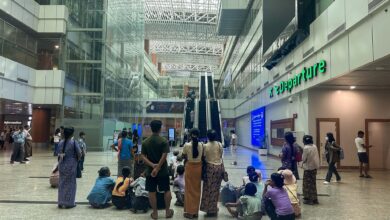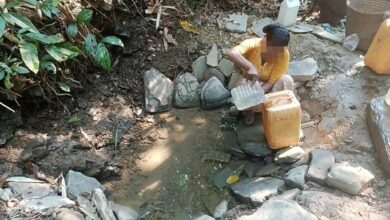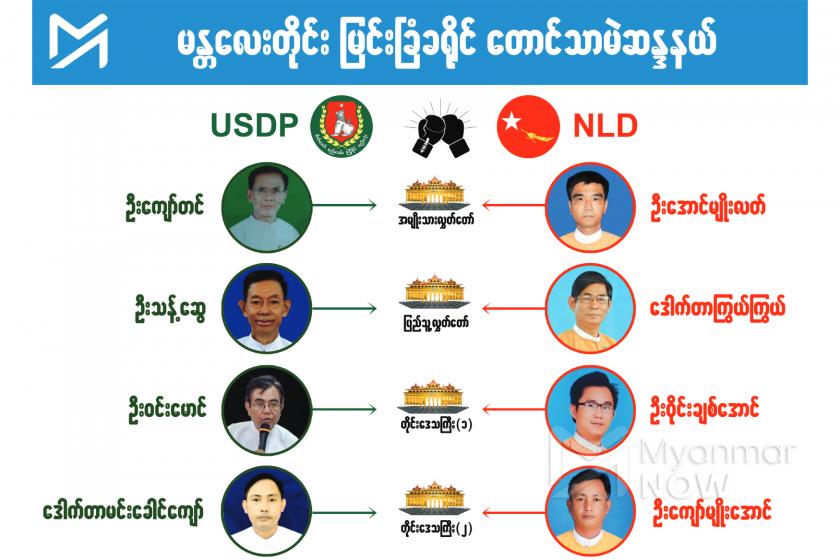
Taungtha, a small upcountry township in Mandalay region, is an unlikely focus of national political attention. But as next month’s election approaches, all eyes are on this once unshakeable bastion of support for the Union Solidarity and Development Party (USDP).
As the hometown of party stalwart Aung Thaung, a retired army colonel with close ties to the leaders of Myanmar’s former ruling junta, Taungtha reaped the benefits of having a native son with friends in high places. But with his death shortly before the 2015 election, local voters showed the limits of patronage politics.
The upset win by the National League for Democracy (NLD) in a USDP stronghold sent a clear signal that Taungtha, along with the rest of the country, was ready for a break with the past.
Now, however, the USDP is hoping it can redeem itself and reclaim its place in the hearts and minds of the people of Taughtha. Its success or failure in this endeavour will be seen by many as an indication of whether the army-backed party has much of a future.
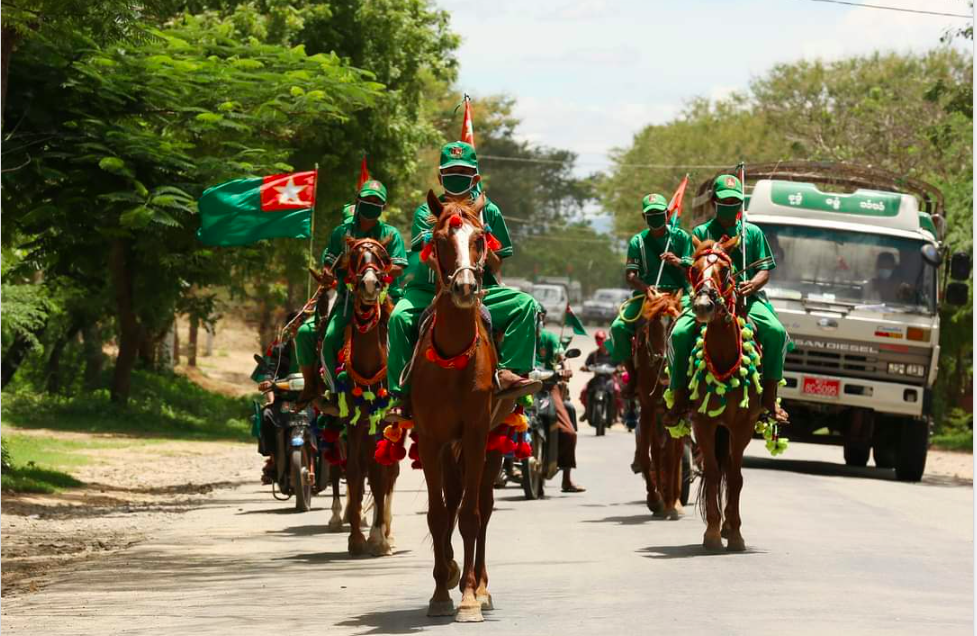
Taungtha in transition
Located near the geographic centre of Myanmar, Taungtha is mostly known as a producer of palm sugar and onions. But as the birthplace of Aung Thaung, it also enjoyed prominence as town close to the hearts of the country’s military leaders.
Born in the village of Kyauk Kar, Aung Thaung joined the armed forces as a young man and steadily worked his way up through the ranks to become a highly influential figure in the military community.
Fiercely loyal to his superiors, he earned the trust of both Senior General Than Shwe and Vice Senior General Maung Aye, the two most powerful men in Myanmar under the former regime.
Officially, he served as the deputy minister for commerce and the minister of livestock and fisheries; but unofficially, he was better known as one of the orchestrators of the 2003 Depayin massacre, which left scores of NLD supporters dead. For this, he was placed on a US blacklist of junta hardliners.
But none of this really mattered in Taungtha, where Aung Thaung received widespread public support for his regional development activities and personal attachment to the place of his birth, according to Mandalay USDP chair Win Maung.
“The minister was very attached to the township and would help anyone from there who asked. That’s why they were also strongly attached to him. They loved and supported him,” he said.
“Generally speaking, we’re winning in Taungtha,” said NLD candidate Dr Kywe Kywe
In 2010, Aung Thaung easily won a seat representing Taungtha in the Pyithu Hluttaw, in an election that the NLD boycotted. He also chaired the Pyithu Hluttaw’s bank and finance development committee.
But before he could put local loyalties to the test in the 2015 election, which the NLD decided to contest, Aung Thaung had a stroke and died while receiving treatment in Singapore. Many speculated that the USDP’s loss in that election was due to his sudden death.
Others, however, believed that Aung Thaung’s influence was already waning as a result of shifts in Myanmar’s political landscape, as well as the increased political awareness of the public in Taungtha.
“Taungtha is known for its associations, but we were very satisfied with the level of public support we received in 2015,” said Wine Chit Aung, the NLD candidate for Taungtha township constituency no.2, who defeated his USDP rival Tint Way five years ago by more than 20,000 votes.
He added that while there are still pockets of support for the party that represents the old guard, he thinks they are small and dwindling fast. That’s why he believes the NLD will do even better this time around.
Unlike the last time Taungtha went to the polls, he said, this year’s election won’t be marred by the same level of interference. In 2015, NLD candidates on the campaign trail weren’t even allowed to greet supporters.
Taungtha native Aye Myat Kyu, owner of an electrical supplies store, agreed that conditions have greatly improved and no longer favour Aung Thaung’s style of politicking.
“When former minister Aung Thaung had influence, everyone was persuaded in various ways to join the USDP. It was a time when people had difficulty expressing their beliefs because it was a dictatorship. It seemed like the town was under his influence,” she said.
In 2015, the NLD won in all constituencies in Taungtha, picking up every seat representing the township in both the upper and lower houses of the Union parliament and in the state legislature.

Two major opponents in a five-way fight
Located in Mandalay region’s Myingyan district, Taungtha township has six quarters, 77 village groups, and a total of 243 villages. Home to more than 240,000 people, it has nearly 200,000 eligible voters.
According to the Taungtha township election commission, there are 17 polling stations in the town and 305 in the villages. Taungtha has no military polling stations.
Twenty candidates from five political parties—the NLD, the USDP, the United Democratic Party (UDP), the Union Betterment Party (UBP), and the National Unity Party (NUP)—will be competing to represent the constituency, but locals say it will be mostly a battle between the NLD and the USDP.
On the NLD side, Dr Kywe Kywe is running for Taungtha’s single seat in the Pyithu Hluttaw; Aung Myo Latt, for its seat in the Amyotha Hluttaw; and Wine Chit Aung and Kyaw Myo Aung, for its two seats in the regional parliament.
Their USDP rivals are Thant Swe (Pyithu Hluttaw); Kyaw Tin (Amyotha Hluttaw); and Win Maung and Dr Min Khaung Kyaw (regional parliament).
“The USDP has been spending a ton of money in Taungtha,” said local charity worker Zaw Myo Tin
So far, the NLD seems to have the upper hand.
“Generally speaking, we’re winning in Taungtha,” said the NLD’s Dr Kywe Kywe, before adding a note of caution: “We’re being careful to not get punished for violating Covid-19 prevention measures. That’s something we’re worried about
A sitting member of the Amyotha Hluttaw, Dr Kywe Kywe defeated USDP regional chair Win Maung by almost 60,000 votes in 2015. He said he expects his party to do well again this year.
Thant Swe, his USDP rival in this year’s election, is a native of Aung Thaung’s hometown Kyauk Kar, and also a former military staffer, according to the mVoter application and details released by the Union Election Commission.
But whether Thant Swe’s personal background will help him in this contest or not remains to be seen. As fellow USDP candidate Win Maung explained, there are places where Aung Thaung’s influence can still be felt, but there are also others where that is not the case.
“It’s difficult to predict the future. We’ll see what happens on the date of the election,” he said.
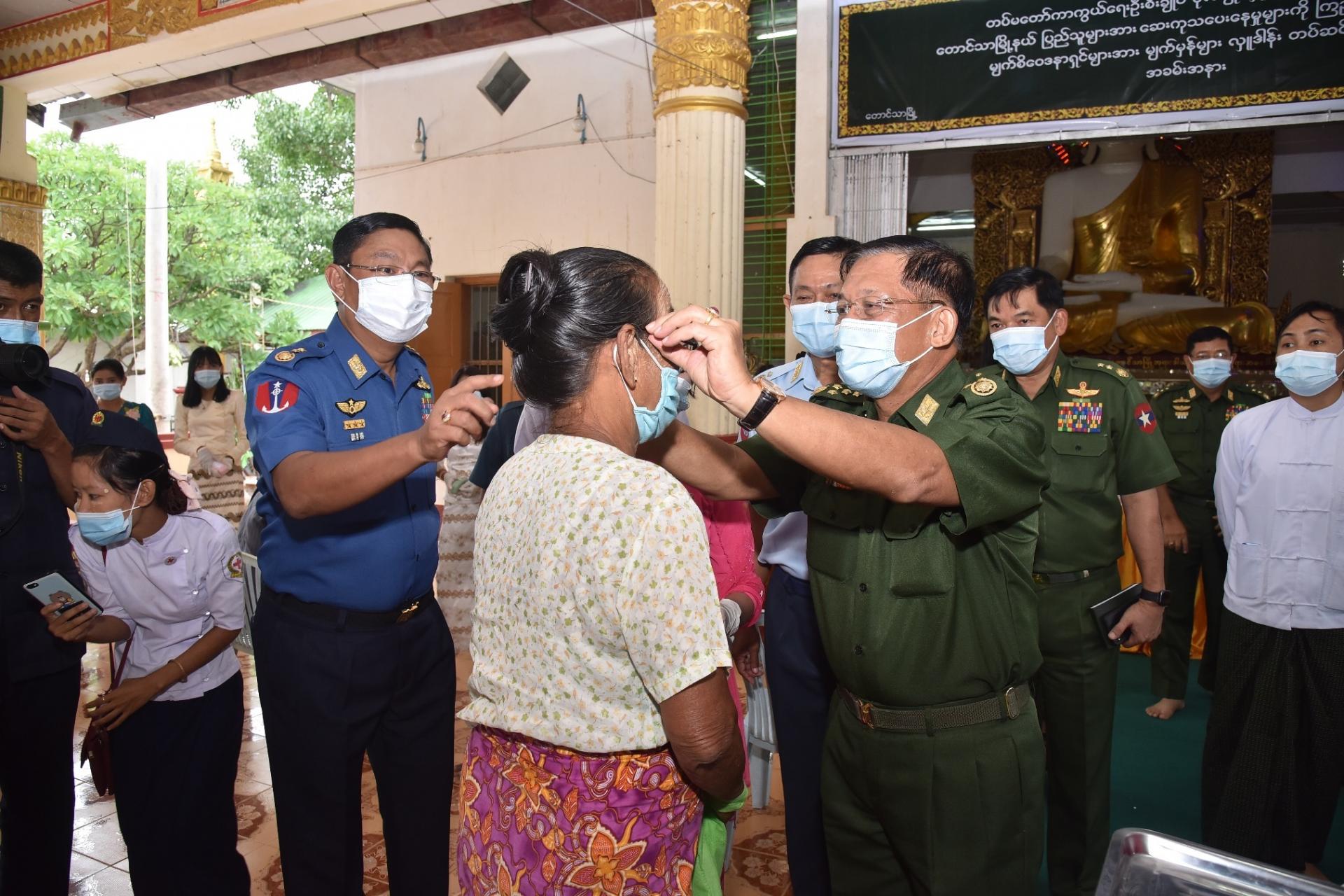
‘Vote for a good person’
Meanwhile, Myanmar’s military is doing its best to keep Aung Thaung’s legacy alive.
On August 25, the commander-in-chief of the armed forces, Senior General Min Aung Hlaing, visited Taungtha to make donations to local monasteries and contribute to the construction of roads in the area.
Although he didn’t openly endorse any candidate, he urged the public to vote for “good” candidates who work for the good of the country. Since then, the USDP has followed his example and stepped up its philanthropic work.
Thant Swe has been especially generous, in an apparent effort to live up to Aung Thaung’s reputation for largesse. Locals say he has personally donated tens of millions of kyat to build a road up the Taungtha hill on the Myingyan-Taungtha road.
According to Zaw Myo Tin, a worker at a local youth charity, Thant Swe and other USDP candidates have been handing out money for construction materials all over the township.
“Maybe it’s because this is the campaign period, but the USDP has been spending a ton of money in Taungtha,” he said.
But the party denies that its activities have anything to do with the election.
“We’re not doing anything special. It’s just the same as we always do,” said USDP state parliament candidate Dr Min Khaung Kyaw, who claimed that the party wasn’t engaged in any campaign activities, but was simply continuing with its usual work of helping local people.
“Sometimes they seem as if they support us, but that isn’t necessarily the case,” said USDP candidate Dr Min Khaung Kyaw
“When we’re allowed to, we’ll go on campaign trips and greet our supporters. In the meantime, we’ll just do our best to communicate with supporters of the other parties, to let them know that they shouldn’t start fights. That’s all,” he told Myanmar Now.
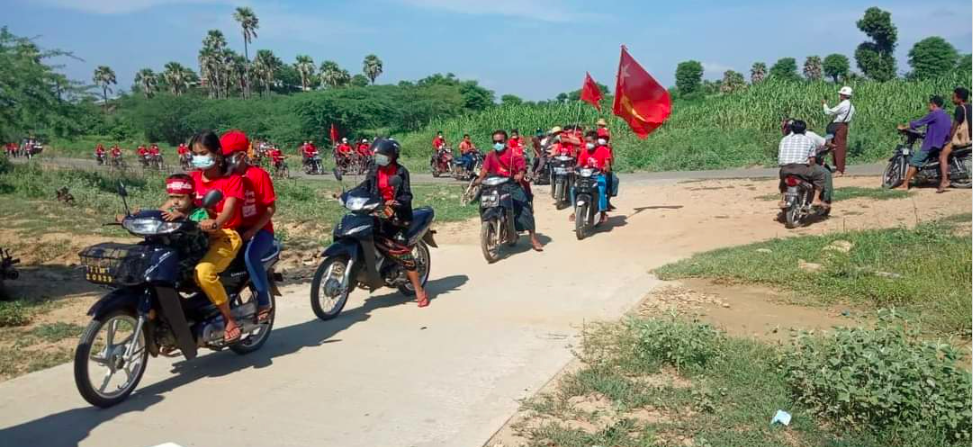
The people will decide
Ultimately, the outcome of the election will hinge not on Taungtha’s past ties to an influential figure, but on each party’s record, according to political analyst and former MP Ywal Tun.
While some voters may still base their choice on old allegiances, most will compare life under USDP rule with their present circumstances after five years of NLD government and then vote accordingly, he said.
Seen from this perspective, the final tally could be closer than many observers expect.
However, despite some dissatisfaction with the NLD’s performance in power, local support for the party is still strong, according to 44-year-old Taungtha native Maw Kyi Soe.
Local voters say that if anything works in the USDP’s favour, it is the fact that three of its candidates hail from the area, while Kyaw Myo Aung is the only Taungtha native running under the NLD banner.
The USDP has made much of this, saying that a good representative should be familiar with the place they’re representing. But the NLD candidates have played this down, arguing that all that matters is how well they do the job.
The NLD is confident that it can run successfully on its record.
According to Dr Kywe Kywe, Taungtha has better roads and greater access to electricity than ever since the party took office. More importantly, he said, the public now has the freedom to speak without fear.
The USDP, meanwhile, seemed less certain of its chances of victory.
“It’s politics. We’ll know the exact result on November 8. It’s not predictable. Sometimes they seem as if they support us, but that isn’t necessarily the case,” said USDP candidate Dr Min Khaung Kyaw.


